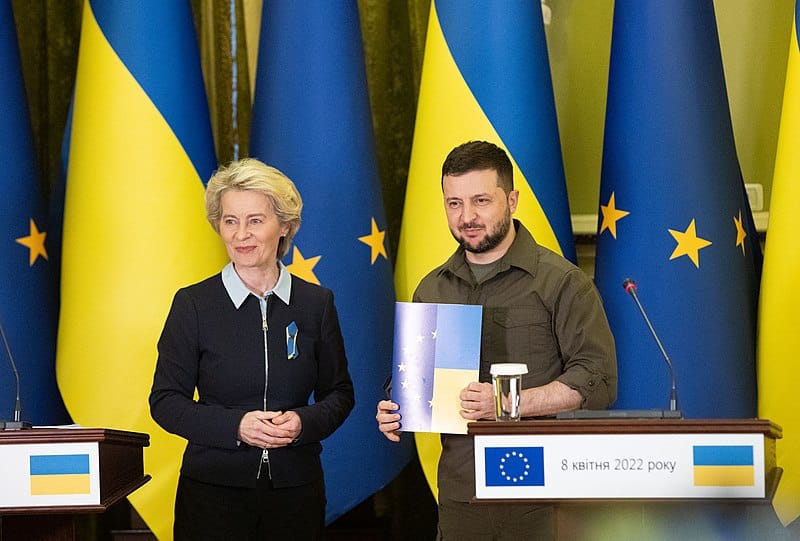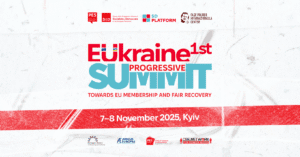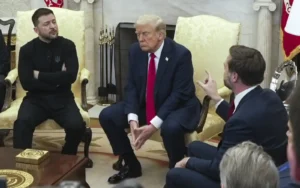Volodymyr Zelensky and Ursula von der Leyen 2022
In early February, President of the European Commission Ursula von der Leyen and President of the European Council Charles Michel met with Ukrainian President Volodymyr Zelenskiy during the EU-Ukraine summit. The key message was that Ukraine will eventually become an EU member. The focus has shifted from “if” to “when”. However, it was made clear that his can only happen when Ukraine fulfils all the necessary criteria and completes all tasks. Ukraine’s accession to the EU is highly probable, but the timing remains uncertain.
In order to be eligible for EU membership, Ukraine has to meet the Copenhagen criteria, established in 1993, which include having stable democratic institutions, a functioning market economy, and the capacity to fulfil membership obligations while upholding human rights and minority rights. In June 2022, the European Commission established seven recommendations that resulted from Ukraine’s new candidate status. These include the establishment of a transparent and fair selection process for judges of the Constitutional Court, continuing with combating corruption and appointing a new head for the Specialized Anti-Corruption Prosecutor’s Office. Third, ensuring anti-money laundering legislation. Fourth, implementing the Anti-Oligarch law to limit the influence of oligarchs on the economy and political domain. Fifth, counteracting vested interests by adopting a media law and empower independent media, and lastly, finalizing the ongoing reform of the legal framework for national minorities.
Contested Media law
Media reforms play a vital role in Ukraine’s EU membership, but the new media law, known as the “On Media” law, sparked a debate, with some praising its potential to combat Russian disinformation and others condemning if as a threat to press freedom. The law was introduced by Zelenskiy in 2019 and went into effect on March 31. It replaces six outdated media laws that have been largely unchanged since 1991. The law introduces strict transparency standards, requiring media outlets to disclosure information about their stakeholders and owners. Supporters of the law view this as a positive step to limit the influence of stakeholders on editorial independence. Additionally, lawmakers claim that the law will aid in the fight against Russian disinformation. The law grants the media regulator the power to block both registered and unregistered online media platforms after issuing multiple violation notices.
However, the law has faced criticism from international journalists’ unions, including the European Federation of Journalists and the Committee to protect Journalists. They argue that the law grants unprecedented powers to the National Council for Television and Radio, jeopardizing its political independence. Concerns arise from the fact that half of the council’s members are appointed by the Ukrainian President, while the other half is appointed by Parliament. However, lawmakers made almost 1,000 pages of amendments based on the concerns by media groups. In response to the criticisms, several contentions provisions have been removed from the new media law in Ukraine. These include mandatory registration of media, the ability to block outlets without court decisions, and the proposal to categorize bloggers and social media users as media entities. The dominance of President Zelenskiy’s party in Parliament further raises doubts about the regulator’s independence. Despite the divisions, some platforms, such as Detector Media, a media watchdog and NGO, have welcomed the law. The European Commission also expressed support, noting that the law aligns with the EU’s Audiovisual Media Services Directive. The Commission, however also emphasized the need to address certain aspects of the law to ensure media freedom and pluralism.
Long way to go against corruption
Ukraine’s authorities have intensified their efforts to combat corruption, leading to a series of arrests of high-profile oligarchs and terminating employments in the government body. Corruption has long been a significant challenge for Ukraine. According to Transparency International’s corruption perception index 2022, Ukraine is Europe’s most corrupt country, and is in 33rd position worldwide, just ahead of Niger and Kenya. Although the country has made some progress, critics argue that certain investigations have targeted businesspeople who joined the government to contribute to Ukraine’s post-2014 revolution economic revival rather than focusing on truly corrupt individuals.
The Organization for Economic Cooperation and Development (OECD), acknowledged in their rapport certain proposed improvements by Ukraine’s Interior Ministry. However, the report also highlighted that high-level corruption remains persistent in Ukraine, with continuous challenges in effectively combating it. The investigation, prosecution, and adjudication of high-level corruption cases face significant obstacles due to substantial political or other unwarranted interference, undermining their overall effectiveness. Transparency International Ukraine’s Katya Ryzhenko called for a review of Ukraine’s anti-corruption authority: “It is a good sign that despite being in a middle of a war, Ukraine’s anti-corruption ecosystem is not afraid to ga after the big names and to have these cases transparently adjudicated by independent Judges. However, Ryzhenko also highlighted serious operational problems within Ukraine’s anti-corruption bodies. A former Ukrainian official, who played a key role in establishing these bodies, expressed concerns that officials seemed to be targeting individuals for corporate governance breaches, rather than overt corruption.
Still progress
However, the Cabinet of Minister in Ukraine approved the State Anti-Corruption Program for 2023-2025, which implements the anti-corruption strategy. The program encompasses a comprehensive set of over 1,700 measures spanning 15 policy areas, aimed at diminishing corruption levels and promoting integrity. These policy areas include the judiciary, defense, law enforcement, state regulation of the economy, education, healthcare and more. One of the primary objectives is to establish a framework that guarantees the accountability of individuals involved in corruption, while enhancing the effectiveness of the anti-corruption system.
Additionally, a new head of the Specialized Anti-Corruption Prosecutor’s Office (CAPO), previously selected through merit-based competition, has now been appointed. And the selection process for a new director of the National Anti-Corruption Bureau (NABU) has been launched in an open and transparent manner, with a commission consisting of Ukrainian and international experts. Despite being in the middle of a war, the anticorruption institutions made great progress. Both NABU and CAPO regularly publish reports on their work, and this year, over 150 individuals were brought to justice and more than 40 cases went to the High Anti-Corruption Court, which resulted in 20 prison sentences. From these cases, the transfer of seized funds worth 1.2 billion Ukrainian hryvnia to the country’s armed forces has made a significant contribution to the war effort. Meanwhile, three pieces of anti-money-laundering legislation have already been ratified or adopted. Namely, the Additional Protocol to the CoE Convention on the Prevention of Terrorism has been implemented, while the other two, one on international cooperation in criminal proceedings and one on sanctions policy, are to be finalized before being put to vote in parliament.
New law has results
In November 2021, President Volodymyr Zelenskiy launched the process of dismantling Ukraine’s oligarchic system by signing the anti-oligarch law. Registered oligarchs are banned from financing political parties, cannot participate in the privatization of major companies and must submit a special declaration of their income. The anti-oligarch law has already proven to be effective. Last summer, Ukraine richest man, Rinat Akhmetov, handed over all licenses pertaining to his media group. Finally, the draft law on national minorities has been discussed with the representatives of these communities and amended according to the recommendations of CoE experts. This law establishes the legal framework for state policy in terms of protections and ensuring the rights of national minorities. The law’s implementation will also be aided by the state program “Unity in Diversity,” which will be developed in consultation with representations of these communities.
Over recent months, significant steps have been taken to reach all seven of the reform goals set out by the European Commission. While Ukraine might not be ready to become a member of the EU yet, it has shown great progress. However, Ukraine is still plagued by deep structural issues and it could take many years for the country to get ready for joining the EU. Countries that previously signed an Association Agreement with the EU, similar to Ukraine’s agreement, typically progresses to become EU candidates within an average of 7.3 years. Following Ukraine’s trajectory, it is reasonable to anticipate that Ukraine’s path to EU membership will need this average time.
Amidst the ongoing war, Ukraine’s political leaders are now contemplating the future task of rebuilding the country. In a collaborative evaluation conducted by Ukraine’s government, the World Bank, the European Commission, and the United Nations, published in March, the estimated cost of Ukraine’s reconstruction and recovery was measured at $411 billion, surpassing twice its economic output. Additionally, it was assessed that Ukraine would require $14 billion on 2023 alone to address critical and high-priority reconstruction and recovery investment. Kira Rudik, Senior lawmaker in Kyiv emphasized the importance of implementing the recommendations from the EU, in order to built the country back up: “We know that we have a very short window of opportunity of rebuilding the country. Not just rebuilding but building back in a better way. We want to have in place the processes and procedures, the same as in the European Union, to make sure that we will not create new oligarch with this money, but that the Ukrainian people will benefit from it.”
Author: Manouk Bronzwaer



